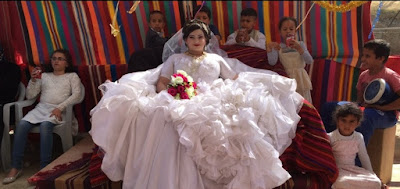An Israeli film that's all about Bedouins, their traditions and halting attempts at some kind of modernity, SAND STORM is original, exotic, fiery and humane -- often simultaneously. What we see happening has the air of something centuries old, even if the plot pivots on how a daughter's cell phone is coincidentally answered by her mother. Taking place mostly in the home of a family in a tribal village in Israel's Negev desert, the film centers on that mother and daughter, both of whom are chaffing at the bit of Bedouin patriarchy.
Part of the movie's surprise and fascination comes from the fact that it seems very different from so much else we've seen come out of Israel -- narrative- or documentary-wise. As written and directed by a filmmaker new to me, Elite Zexer, shown at left, it immediately tosses us in media res and then let us fend for ourselves in figuring out what is happening and why. We do, and pretty quickly, although I suspect folk who live in this part of the world may have a stronger connection to the traditions and mores of the characters we see.
The mother of the family (Ruba Blal, above) is having to prepare, most unhappily, for her husband's wedding to a new wife, while her daughter (Lamis Ammar, below, right), we soon learn, is carrying on a forbidden romance with one of her university peers (Jalal Masarwa, below, left).
Love vs arranged marriage, family ties vs tribal ties, banishment and sacrifice -- all of this pits mother against daughter against father, with escalation heaped upon escalation. When, toward the finale, one character tells another, "There's nothing for you here," we realize that this judgment could apply to literally everyone on view.
Sand Storm could be an unrelentingly sad and difficult movie, but Ms Zexer fills it with such marvelous actors and has given them a screenplay that goes just far enough to fill the audience's understanding without over-explaining anything. The film's final scene, in fact, is completely silent. But it is hugely meaningful, presaging unfortunately what may come for the next generation.
In what may be be the movie's most telling moment, dad's plump and pretty new bride, above and below, implies to the daughter that her own situation as the newbie here is nothing to be pleased about. We never learn the details, but it becomes suddenly clear that there is probably "nothing for her here," either.
This "I have to" attitude, expressed by dad but also by so many other characters in their own way, is what allows -- and disallows -- so much that has and will continue to happen. The movie is certainly feminist and anti-patriarchy, but it lets us see how these traditions -- large and small -- suppress everyone on view. At the wedding ceremony, for instance, certain women (I am guessing they are the former and now-tossed-away wives) must wear fake mustaches. Gheesh.
It is no surprise that this film won the World Cinema Grand Jury Prize at this year's Sundance Fest, and that it was also nominated for twelve -- count 'em -- Ophirs (the Israel's equivalent to our "Oscar"). Because it won six of those, including Best Director and Best Film, Sand Storm becomes automatically designated as Israel’s official submission to the Oscars for Best Foreign Language Film. It is a winner in every way, and we shall look forward to whatever Ms Zexer tackles next.
Meanwhile, Sand Storm, from Kino Lorber, in Arabic with English subtitles and running just 88 minutes, has its U.S. theatrical premiere tomorrow, Wednesday, September 28, in New York City at Film Forum, where it will have a two-week run. The film opens in Los Angeles at Laemmle's Royal on October 7. Elsewhere? Perhaps--once word-of-mouth generates.


































